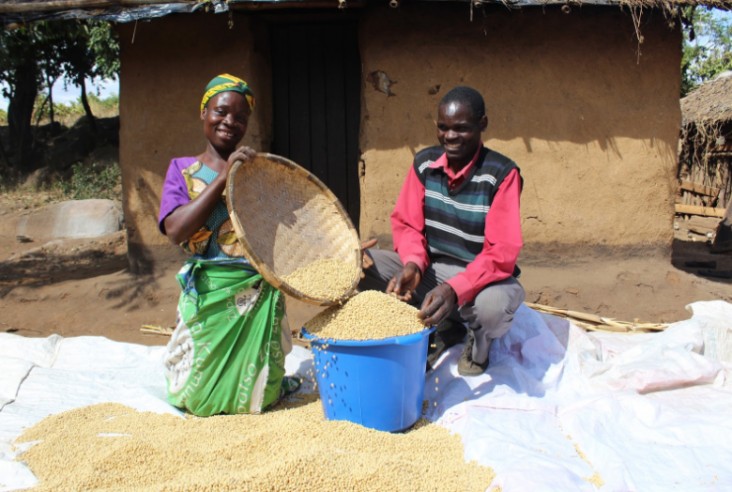Speeches Shim

USAID improves the quality of Malawians’ lives with programs in education, agriculture, health, democracy and governance. We build the resilience of vulnerable rural households, helping communities better withstand and bounce back from recurrent crises.
USAID-managed programs support the following Administration initiatives and Congressional priorities: President’s Emergency Plan for AIDS Relief (PEPFAR), President’s Malaria Initiative (PMI), Power Africa, Preventing Child and Maternal Deaths (PCMD), Feed the Future (FTF), Biodiversity, Combating Wildlife Trafficking, Basic Education, and Water, Sanitation and Hygiene (WASH).
Under our current strategy, the USAID Mission in Malawi divides its work into three main “Development Objectives”: Social Development Improved (Health and Education), Sustainable Livelihoods Increased (Agriculture and Environment), and Citizen Rights and Responsibilities Exercised (Good Governance, Civil Society and Political Competition and Consensus-building).
GLOBAL HEALTH
Our programs prevent and treat malaria, tuberculosis and HIV, and provide support to people living with HIV, as well as orphans and vulnerable children. Within a generation, we aim to end preventable child and maternal deaths by helping households, communities and health facilities adopt high-impact life-saving practices, and by working with the Ministry of Health to provide a continuum of care for women and children. We cooperate with government ministries to improve water and sanitation services, and teach basic hygiene skills. We support voluntary family planning to reduce poverty, improve gender equality and increase women’s empowerment.
AGRICULTURE AND FOOD SECURITY
We help Malawians grow drought-resistant crops that generate more income, improve nutrition and feed more people. Our programs give smallholder farmers access to higher yielding and more drought resistant seeds, improved agronomic practices, finances and markets. The result is greater agricultural productivity, increased incomes and improved nutrition. We encourage reforestation and decreased deforestation to protect habitats and reduce emissions. We also help fisheries expand to provide better nutrition and livelihoods. We provide emergency food assistance to those affected by conflict and natural disasters, and provide development food assistance to address the underlying causes of hunger.
EDUCATION
Our programs improve early grade reading skills and teacher training. We encourage youth, particularly adolescent girls, to complete primary school and continue their education. We provide teacher training, develop better classroom materials and standardized lessons, and promote smaller class sizes in primary schools. We address the educational barriers girls face by improving their reading skills, developing positive sexual and healthcare-seeking behavior to keep girls in school.
DEMOCRACY, HUMAN RIGHTS, AND GOVERNANCE
We improve the accountability and efficiency of local and national government services and increase citizen participation in decision-making. We support the government’s efforts to implement its public sector reform agenda, which will strengthen the civil service for better government performance. The agenda also assists local governments enhance accountability, provide services promptly, and ensure citizens have a say in civic affairs. We strengthen the capacity of civil society organizations so they can improve advocacy, mobilize communities and monitor government performance.
ENVIRONMENT
Malawi suffers from rapid deforestation, overfishing, widespread soil erosion and degradation from unsustainable agricultural practices, and the overexploitation and illegal trafficking of wildlife. These challenges are exacerbated by rapid population growth and vulnerability to the impacts (e.g., drought, unpredictable rain cycles, falling water tables, etc.) of climate change. USAID’s environment activities strengthen the resilience of vulnerable populations by addressing the main drivers of deforestation and overfishing, improving land and water management, and improving the capacity of local communities to manage their natural resource base.
WORKING IN CRISES AND CONFLICT
Our early warning systems provide timely, accurate and actionable information on food security conditions and potential threats. Our programs also address the underlying causes of hunger, improve disaster preparedness, and help the country respond to natural disasters such as floods.
POWER AFRICA
Nearly 90 percent of Malawi’s 17.5 million population is without electricity, which adversely affects the country’s ability to powering economic growth, water supplies, telecommunication services, and health care delivery. Power Africa is helping the Government of Malawi (GoM) establish a foundation upon which the nation’s power system can grow by building and rehabilitating Malawi’s electricity infrastructure; promoting enabling policies and regulations that encourage private sector investments; and helping independent power producers to enter the market.
USAID/Malawi is currently developing its next five-year strategy.


Comment
Make a general inquiry or suggest an improvement.